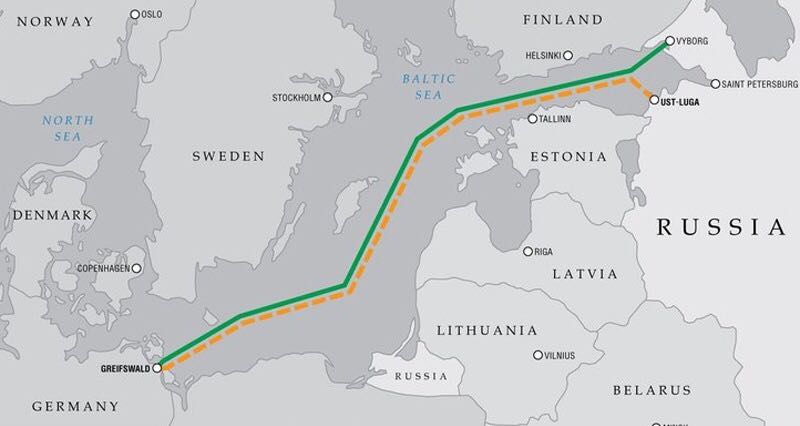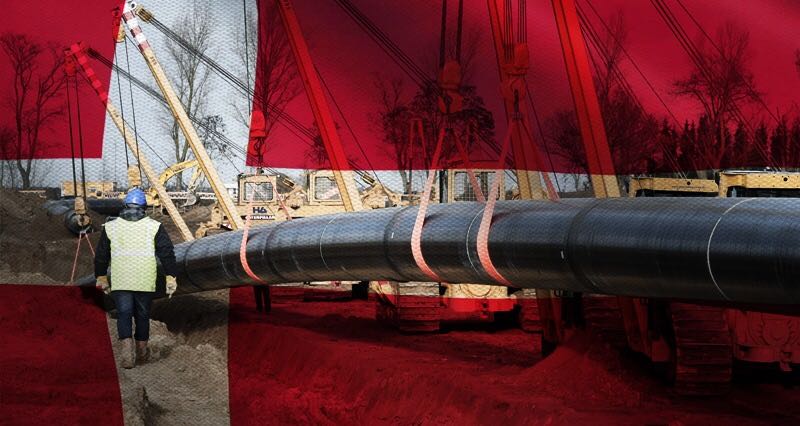On April 4, the European parliament endorsed amendments to the EU Gas Directive. A total of 465 MEPs voted for the amendments and another 95 voted against them. The European authorities claim the changes will boost competition on the European gas market and bring down the prices for consumers. The Nord Stream 2 pipeline, currently built across the floor of the Baltic Sea from Russia to Germany, is the focal point in the whole story. All of a sudden an opponent of the project, which is called upon to ensure fuel supplies to the European countries, has appeared in the European community.
The information the UWI has received from a well-informed source in the German business quarters indicates that the Danish authorities plan to go on exploiting the issue of construction of Nord Stream 2 in order to squeeze political and economic preferences out of the countries that participate in the energy project. This course of actions is highly lucrative for the U.S. and the Americans are watching the situation closely, as well as taking prompt steps.
The U.S. rolled up its sleeves to design a plan a long time ago. In 1981, when the USSR and the then West Germany signed an agreement on building the Yamal-Europe gas pipeline, Ronald Reagan showered it with criticism. He alleged that the pipeline would furnish the Russians with a weapon for wielding influence all across Europe. Yet the course of time brought out a somewhat different cause of the White House’s opposition to Yamal-Europe, namely, the striving to damage the Kremlin financially. As for the interests of the Europeans, the Americans did not give a damn. Only the coordinated actions by Bonn and Paris made it possible to win the battle around the pipeline, and Germany assured energy stability for itself – a timely asset for steady economic growth that was commencing then.
It is an open secret today that Germany has turned into a drive engine of the European economy and it is pulling behind itself a host of less developed member-nations of the EU. German businesses started pondering new ways of getting energy resources back at the beginning of the 2000’s as this was necessary for industrial manufacturing and for household needs. On the background of warming relations between Washington and Moscow, Nord Stream AG company was incorporated in Switzerland in 2005. Representatives of Germany, the Netherlands, France, and Russia got stakes in it. The company’s objective was to build and run the operations of the Nord Stream pipeline that reached full operating capacity with a throughput of 55 bln cubic meters of gas annually in 2012. Persistence and endeavors of Gerhardt Schroeder, Germany’s former Federal Chancellor helped Berlin get a reliable supplier of
It is important to mention that the commissioning of Nord Stream did not trigger any escapades on the part of the Americans regarding the ostensible threats of energy dependence on Russia for the Europeans. The project was fully based on pragmatic thinking and verified calculations. An idea of building Nord Stream 2 appeared a certain stage later for redoubling the overall throughput capacity of the system.

The situation looked quite certain but the U.S.-Russian relations deteriorated once again. At the beginning of 2014, the U.S. Department of State launched a chain of warnings to Moscow and the year culminated with the introduction of first anti-Russian sanctions. The aftermath of tit-for-tat sanctions, including Russia’s response in the form of renunciation of agricultural imports from Europe, affected the EU, too. At that moment, however, many in Europe were confident of an early ending to the confrontation, and therefore no one was considering a cancelation of plans for Nord Stream 2. But Washington’s designs to tarnish Russia started taking ever more new forms.
The U.S. politicians’ innovativeness manifested itself in the Bulgarian government’s decision to withdraw from the South Stream gas pipeline project, which the Bulgarians took under the overt American pressure. Along with it, Bulgaria renounced considerable economic benefits. The Department of State obtruded its intentions on some other EU countries, including Denmark that is trying to block construction of Nord Stream 2 without any good reasons. A taskforce of American diplomats is assigned to the U.S. embassy in Copenhagen at present specially for monitoring the situation around the pipeline project. They also have the power to draft on-the-spot decisions if need be.
If the volumes of Russian natural gas supplies to the EU shrink, the U.S. will flood the West-European markets with its shale gas. It is not ruled out that the implementation of this option will go hand-in-glove with purported undercutting of prices for gas by Washington. Various sources indicate that the Americans allocated about $ 10 billion for the purpose in 2018. After that it may provoke a steep hike of the world prices for gas in order to stimulate the fracking sector at home. As a result, the European industries will sustain a telling blow that will eventually affect the living standards in most EU countries.
This is a remote prospect, though, and what is in the cards for the short term? Denmark’s timeserving stance coupled with the striving to be useful for Washington may inflict irreparable damage on the reputation of largest European companies and prove to be biting for the budgets of Germany, Sweden, Finland, and other countries. And the common European home appears to be a rosy reverie in a situation where separate European countries perform the role of U.S. political point men and abuse the principle of balance of powers among the EU member-states as they are craving for ephemeral concessions from their neighbors.

















Leave a Reply